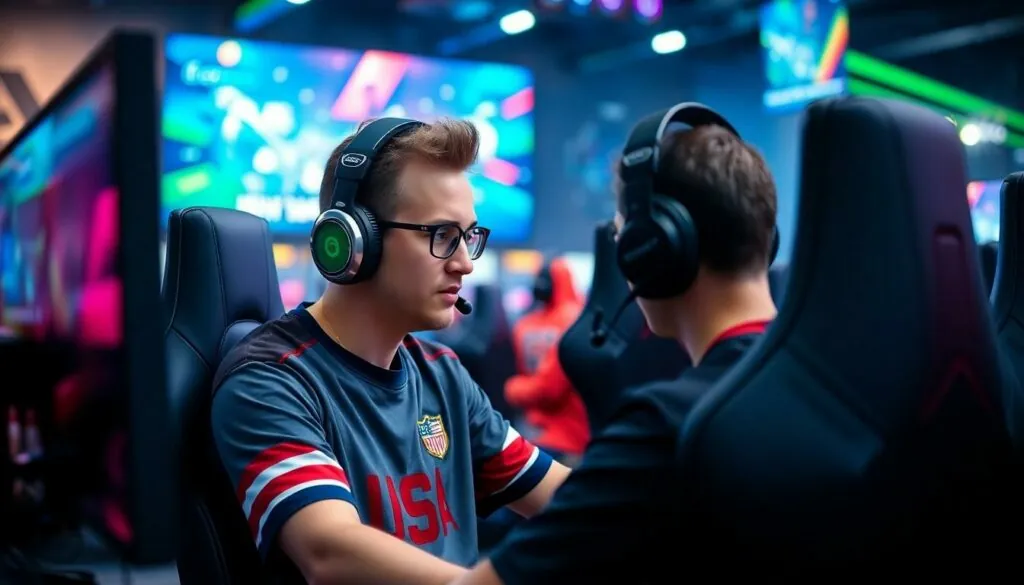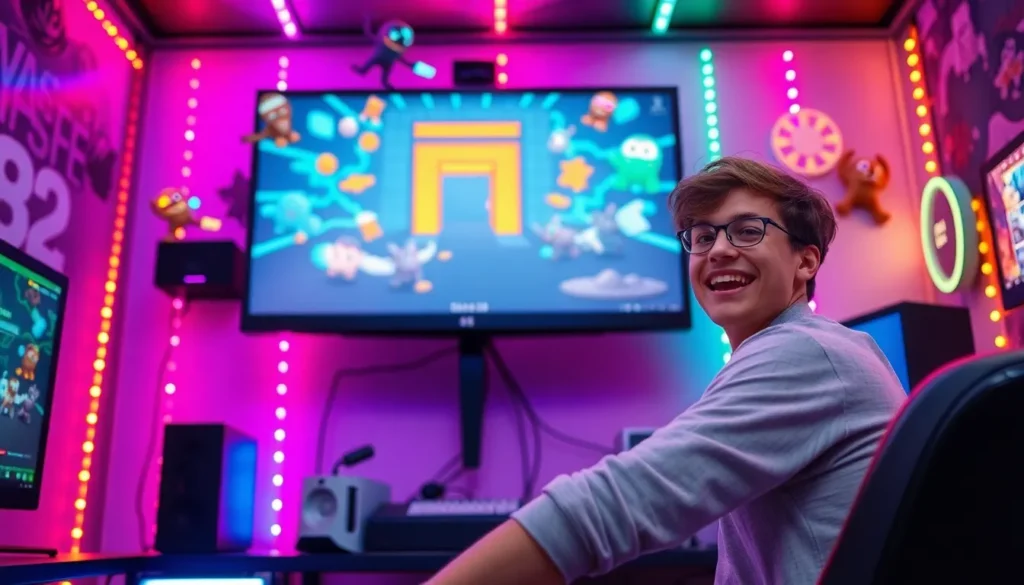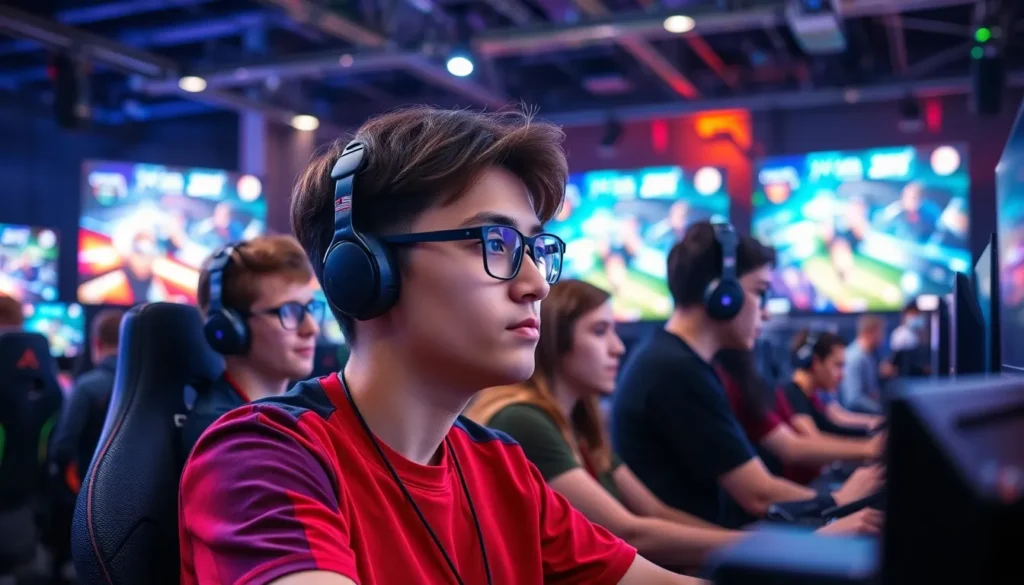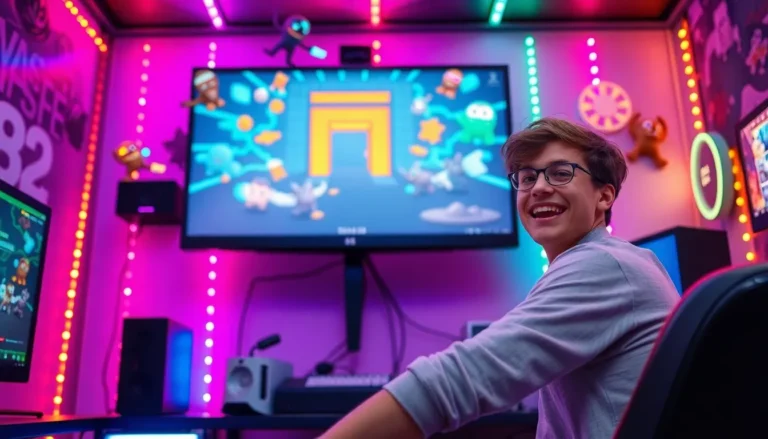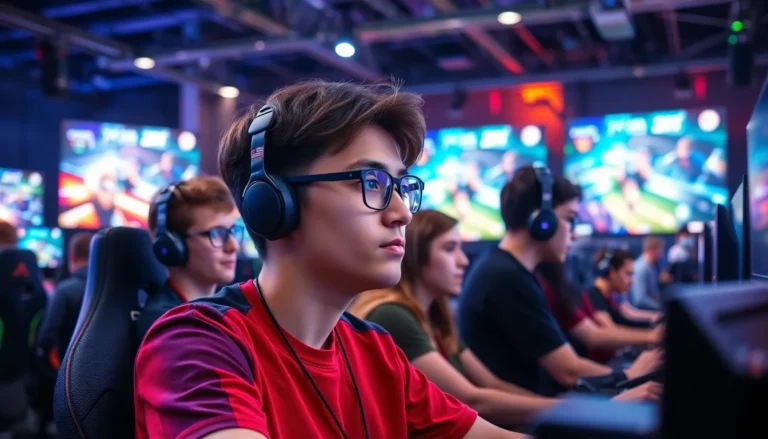Table of Contents
ToggleIn a world where gaming isn’t just a pastime but a full-blown career, esports players have emerged as the rock stars of the digital age. With lightning-fast reflexes and strategic minds, these athletes dominate virtual arenas, captivating millions of fans. Who knew that sitting in front of a screen could lead to fame, fortune, and the occasional sponsorship deal for energy drinks?
Overview of Esports Players
Esports players have become key figures within the gaming industry, resembling rock stars in popularity. These athletes demonstrate exceptional skills, such as quick reflexes and strategic thinking, enabling them to perform at high levels in competitive environments. Players often train for hours each day, honing their techniques and improving their game knowledge.
Numerous fans passionately follow their favorite esports players, leading to substantial online communities and devoted support. A recent study by Newzoo indicated that the global esports audience reached 500 million in 2023, reflecting the industry’s expansive appeal. Players engage with fans through live streams, social media, and events, creating a personal connection that enhances their popularity.
Lucrative opportunities abound in esports, as top-performing players attract substantial financial rewards. In 2022, prize pools exceeded $1 billion across various tournaments, reinforcing the financial viability of an esports career. Sponsorship deals and endorsements further contribute to players’ incomes, with companies eager to partner with high-profile athletes.
Competitive gaming demands more than just technical skill; it requires significant mental fortitude. Successful players maintain intense focus during matches, managing stress effectively while executing complex strategies. Many esports organizations also employ coaches and analysts to support players, optimizing their performance through data-driven insights.
Overall, the esports landscape is ever-evolving, with players continuously pushing the boundaries of excellence. As this industry grows, so too does the recognition of esports players as elite athletes, changing perceptions and fostering mainstream acceptance.
Skills and Attributes of Successful Esports Players
Successful esports players possess a unique blend of skills and attributes. Mastery in areas such as strategic thinking and communication significantly enhances their performance in competitions.
Strategic Thinking
Strategic thinking stands as a crucial skill in esports. Players analyze the dynamics of the game to anticipate opponents’ moves. This approach enhances their ability to counter strategies effectively. Successful players often develop intricate game plans, considering various scenarios and outcomes. For instance, 2023 studies show that teams implementing advanced strategies perform better in matches. Understanding the game’s mechanics deeply contributes to their strategic prowess. Adapting tactics in real-time during high-pressure situations further distinguishes elite players. They leverage both analytical and intuitive thinking to outmaneuver competitors. Ultimately, strategic prowess sets apart those who excel in esports.
Communication Skills
Effective communication plays a vital role in esports success. Players must collaborate seamlessly with teammates during intense matches. Clear and concise communication fosters teamwork and helps in executing strategies efficiently. Studies reveal that well-coordinated teams often achieve higher success rates. Players communicate not only through voice chat but also through non-verbal cues, enhancing their synergy. Establishing trust and rapport among teammates solidifies their gameplay. Moreover, active listening skills ensure that players understand each other’s perspectives and adjustments. Success in fast-paced environments relies heavily on how well players share information and coordinate actions. Ultimately, strong communication skills enhance team dynamics, influencing overall performance.
The Role of Training and Practice
Training and practice play a crucial role in the success of esports players, enabling them to refine their skills and maintain peak performance during competitions.
Daily Routines
Players typically engage in intense daily routines that span several hours. Those routines often include practice sessions, strategic discussions, and physical conditioning. Players may practice individual skills, focusing on game mechanics or strategic execution. Time spent reviewing game footage aids in identifying strengths and weaknesses. Executing these routines creates a structured environment, promoting consistency in performance and skill advancement. Many professional players dedicate upwards of 10 hours each day to training, ensuring they remain competitive in the ever-evolving esports landscape.
Coaching and Mentorship
Coaching and mentorship are essential components in an esports player’s development. Coaches provide tactical insights, helping players navigate complex strategies and enhance their overall gameplay. They also analyze match data for performance optimization, identifying areas for improvement. Mentors often share personal experiences, guiding players through the challenges of professional gaming. Relationships with coaches foster open communication, leading to improved teamwork and synergy during matches. A strong support system through mentorship can significantly influence a player’s career trajectory, elevating their potential within the esports sphere.
Mental and Physical Health Considerations
Esports players face unique mental and physical health challenges as they pursue their careers. Fatigue can result from long hours of practice, so maintaining a balanced routine is crucial. Stress management techniques, such as mindfulness and relaxation exercises, play a key role in enhancing focus during competitions.
Regular physical exercise promotes overall well-being and improves stamina, which is essential for lengthy gaming sessions. Coaches often encourage players to integrate fitness into their daily routines, recognizing the benefits of strong physical health in competitive environments. Nutrition also contributes significantly; a well-balanced diet supports energy levels and cognitive function.
Mental health awareness is gaining traction in the esports community. Organizations offer resources, including counseling services, trained professionals help players cope with the pressures of competition. Many players report that addressing mental health proactively leads to improved performance outcomes.
Concentration must be sustained for extended periods, making mental resilience a top priority. Players often develop personalized strategies to enhance their mental fortitude, allowing for quick recovery from in-game setbacks. Regular breaks during practice can also help maintain high levels of mental clarity.
Social connections within the gaming community provide essential support systems. Players often cultivate friendships and partnerships, which help reduce feelings of isolation associated with the intensity of esports careers. Engaging with teammates fosters collaboration, enhancing team dynamics and performance.
Ultimately, prioritizing both mental and physical health paves the way for sustainability in esports careers. With continuous support and guidance, players can navigate the challenges of competitive gaming while thriving in the ever-evolving industry landscape.
The Impact of Esports Players on Popular Culture
Esports players significantly shape popular culture, drawing parallels to traditional celebrities. Their skills and charisma attract millions of fans, creating a vibrant community around competitive gaming. As the global esports audience reached 500 million in 2023, the influence of these players became increasingly evident. They engage fans through social media platforms, sharing insights, gameplay tips, and personal anecdotes, which deepen connections.
Brand partnerships elevate their visibility beyond gaming. Companies recognize the marketing potential in aligning with popular players, resulting in lucrative sponsorship deals. Revenue from endorsements supplements their prize money, often exceeding $1 billion in tournament pools across various events in 2022. These ventures enhance the players’ public persona, placing them at the forefront of youth culture.
Their unique lifestyles also resonate with fans. Training routines, often exceeding 10 hours per day, demonstrate commitment and discipline. Through regular updates about their lives, players inspire their followers, promoting values of hard work and perseverance. Workshops and online streams create opportunities for players to foster relationships with aspiring gamers, showcasing the path to success in an accessible manner.
Furthermore, players advocate for mental health awareness, encouraging open discussions around the challenges they face. Promoting balanced routines, they help destigmatize mental health issues within the gaming community. Initiatives aimed at improving player well-being also gain traction, solidifying their roles as role models. Players frequently address the importance of managing stress and maintaining physical health, further influencing their fans.
In sum, esports players have an undeniable impact on popular culture. Their skills, personalities, and advocacy resonate beyond gaming, shaping the landscape of modern entertainment and set new standards for future athletes.
Conclusion
Esports players are redefining the landscape of modern entertainment with their remarkable skills and dedication. Their influence extends beyond gaming as they cultivate passionate communities and challenge traditional views of athleticism. As they navigate the pressures of competition and the demands of their careers, prioritizing mental and physical health becomes essential for longevity in the industry.
With the support of coaches and a focus on strategic development, these players continue to push their limits and inspire fans worldwide. As the esports scene evolves, the legacy of these athletes will undoubtedly shape the future of competitive gaming and its place in popular culture.

